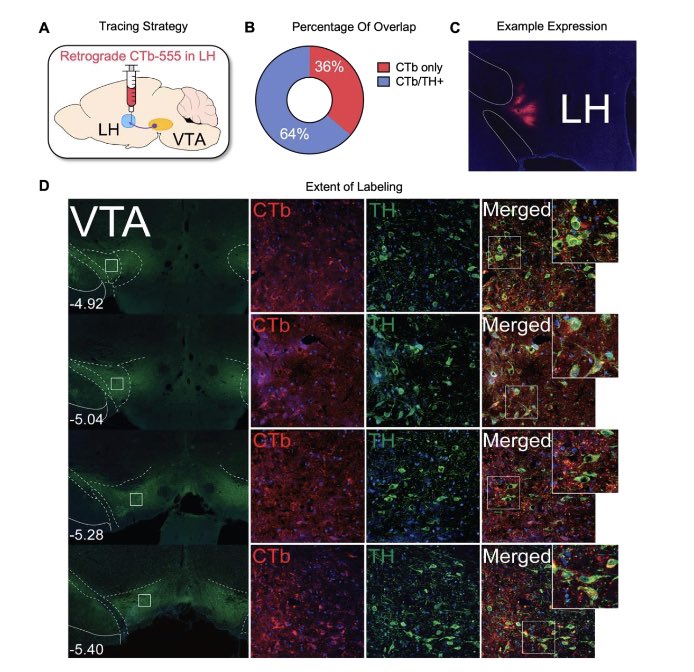Novel Projection from VTA Dopamine Neurons to Lateral Hypothalamus Implicated in Addiction
A novel projection from VTA dopamine neurons to lateral hypothalamus has been revealed to have a function. This circuit has been implicated in addiction. It has been previously shown that lateral hypothalamus is important for learning over and above its canonical role in feeding. The current paper reveals that learning occurring in lateral hypothalamus is important.

Dr. Melissa Sharpe
Neuroscience, Prefrontal Cortex, Dopamine, Lateral Hypothalamus, Associative Learning, Wine. Assistant Professor, UCLA. 🇦🇺 in 🇺🇸 (She/Her).

-
Very excited to have @ivybhoang’s first experimental paper from the lab on bioRxiv!! In it, she reveals the function of a novel projection from VTA dopamine neurons to lateral hypothalamus! Ivy also implicates this circuit in addiction.
— Dr. Melissa Sharpe (@MelissaJSharpe) March 3, 2023
Check it out🔥: https://t.co/He4s84KvPH -
We have previously shown that lateral hypothalamus is important for learning over and above it’s canonical role in feeding. https://t.co/I8qcU4zcZf
— Dr. Melissa Sharpe (@MelissaJSharpe) March 3, 2023 -
This showed that lateral hypothalamus was important for learning but did not reveal the nature of that learning. In the current paper, @ivybhoang reveals that learning occurring in lateral hypothalamus is model based (involves specific representations of cues and outcomes).
— Dr. Melissa Sharpe (@MelissaJSharpe) March 3, 2023 -
Next, Ivy asks where the necessary teaching signal comes from to learning in lateral hypothalamus. We reason it was probably VTA dopamine neurons because we have previously shown these neurons contribute to model-based learning.https://t.co/tYyNc73BFr
— Dr. Melissa Sharpe (@MelissaJSharpe) March 3, 2023 -
Given there is not much evidence for a direct dopamine projection from VTA to LH, Ivy first traces out this circuit and reveals a dense projection from VTA to LH and shows it is predominantly dopaminergic in nature. pic.twitter.com/kmQejDMRay
— Dr. Melissa Sharpe (@MelissaJSharpe) March 3, 2023 -
Ivy then uses optogenetics to stimulate or inhibit this circuit and shows that it is sufficient and necessary for the development of model-based associations between cues and rewards.
— Dr. Melissa Sharpe (@MelissaJSharpe) March 3, 2023 -
As Ivy’s passion lies in addiction, she tests the impact of methamphetamine self-administration on model-based behavior. She finds drug exposure enhances model-based control of cues over behavior, which is accompanied by a bidirectional strengthening of the LH-VTA circuit.
— Dr. Melissa Sharpe (@MelissaJSharpe) March 3, 2023 -
This is counterintuitive as we typically consider the impact of drugs over behavior as enhancing model-free habits that lack representations of outcomes. We think the difference is that we have tested the Pavlovian rather than instrumental processes typically studied in addiction
— Dr. Melissa Sharpe (@MelissaJSharpe) March 3, 2023 -
This data suggest that the hypothalamic-midbrain circuit is critical for model-based learning and strengthened in addiction. We think the role of this circuit needs to be considered for a wholistic model of addiction that encompasses Pavlovian and Instrumental processes.
— Dr. Melissa Sharpe (@MelissaJSharpe) March 3, 2023 -
Super proud of @ivybhoang’s amazing hard work! And grateful to all coauthors for their awesome input including @A_Izquierdo1, and the other twitterless contributors (Joseph Munier, Anna Verghese, Zara Greer, Lauren DiFazio, Courtney Sercander, and Sam Millard)!
— Dr. Melissa Sharpe (@MelissaJSharpe) March 3, 2023
